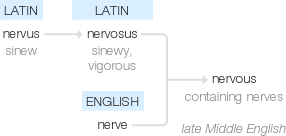Nervous
late Middle English (in the senses ‘containing nerves’ and ‘relating to the nerves’): from Latin nervosus ‘sinewy, vigorous’, from nervus ‘sinew’ (see nerve). nervous (sense 1) dates from the mid 18th century.
wiktionary
From Middle English nervǒus(“containing nerves; made up of nerve-like fibres; of or relating to nerves; containing sinews or tendons, sinewy; affecting sinews or tendons”), from Latin nervōsus(“nervous; sinewy; energetic, vigorous”), [1] from nervus(“nerve; muscle; sinew, tendon; (figuratively) energy, power; nerve; force, strength, vigour”) (ultimately from Proto-Indo-European *snéh₁wr̥(“sinew, tendon”)) + -ōsus(suffix meaning ‘full of, prone to’ forming adjectives from nouns). [2] The English word is analysable as nerve + -ous.
etymonline
nervous (adj.)
late 14c., "containing nerves; affecting the sinews" (the latter sense now obsolete); from Latin nervosus "sinewy, vigorous," from nervus "sinew, nerve" (see nerve (n.)). The meaning "of or belonging to the nerves" in the modern anatomical sense is from 1660s.
From 1630s it was used (of writing style, etc.) in the sense of "possessing or manifesting vigor of mind, characterized by force or strength." But the opposite meaning "suffering disorder of the nervous system" is from 1734, hence the illogical sense "restless, agitated, lacking nerve, weak, timid, easily agitated" (1740). This and its widespread popular use as a euphemism for mental forced the medical community to coin neurological to replace nervous in the older sense "pertaining to the nerves." Nervous wreck first attested 1862; nervous breakdown 1866. Related: Nervously; nervousness.
